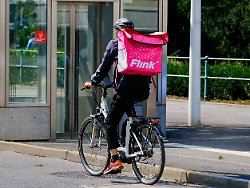Investors are pumping vast amounts of money into lightning delivery services like Gorillas and Flink at an insane pace. So far, however, the startups have only been burning money instead of writing in the black. The food marketing expert Otto Strecker assumes that this will not change.
Whether Gorillas, Flink, Getir or Gopuff, the Blitz delivery services all have one thing in common: They have to deal with substantial losses. But that doesn’t deter investors. On the contrary: They bet that customers will change their shopping habits and invest a lot of money in startups. According to data from Pitchbook, investors pumped three billion euros into 44 companies worldwide in the first half of 2021 alone. Of this, 1.3 billion euros went to Gorillas, Flink and Getir. It has not yet been decided whether these investments will pay off for the donors.
Critics doubt that companies will ever be in the black. “If a bicycle courier drives ten minutes to the customer for a delivery fee of 1.80 euros and companies organize a gigantic advertising battle for it, you cannot earn any money with it,” says Otto Strecker, expert in food marketing and board member of the AFC Consulting Group AG in Bonn ntv.de.
According to Strecker, investors accept the risk of going empty-handed in the end because they are faced with a fundamental problem: “There is simply too much money.” In phases of zero interest rates, any return that is greater than zero is a good return. There is outweighing hope that the startups will develop a model that creates a monopoly that ultimately outdoes all competitors.
Swift takes position
“In the hope of making big money in the end, insanely high losses will be accepted along the way.” Until dominance is achieved, the only currency is traded in: market share. But this logic does not work for Strecker. While the restaurant supply chain Lieferando does not operate its own kitchens and only organizes transport, Gorillas and Flink rent their own storage facilities. “In the end, even the last player in the market has a difficult cost structure,” says Strecker. He therefore predicts tough cut-throat competition: the old economy will buy into the lightning delivery services.
The fact that the supermarket giant Rewe and Flink agreed on a strategic partnership at the beginning of June supports his forecast. This example also shows who is actually dependent on whom: “Not Flink is an attractive partner for Rewe, but Rewe is an attractive partner for Flink,” says Strecker. Gorillas and Flink also find it so difficult to stay in the black because grocery delivery services actually only earn their money by shopping. And with that, even big players like Kaisers Tengelmann or Rewe have their difficulties.
Blitz delivery services move too little and therefore cannot buy cheaply. “The partnership with Rewe means that Flink has access to Rewe’s purchasing conditions.” This significantly improves the starting position for the race at the top for Flink. “We are convinced that, through our cooperation in the goods sector, we are making a decisive contribution to making Flink number one in its segment in Germany,” says Rewe boss Lionel Souque. For a heavyweight like Rewe, however, according to Strecker, such a collaboration is not about making big money. The company wants to learn a lot more about digitizing its processes.
Competition has become even tougher
“We have seen for decades that food delivery is hardly profitable,” says Strecker. Unless companies charge high delivery fees. The market is not yet able to do that. That is why even Amazon does not really succeed in being successful with its Amazon Fresh delivery service. It’s been ten years since Amazon Fresh entered the market. “I don’t see that we are now all supplied with food across the board by Amazon Fresh.”
Strecker recalls that shortly before the dot-com bubble burst, there were a number of attempts to make money from grocery delivery services. “That didn’t work back then. All attempts failed with a crash.” And at that time the ambitions were still comparatively cautious. After all, there has been no talk of deliveries every ten minutes for twenty years.
In the end, the competition has become even tougher than it already is. The declining growth gives restaurant suppliers like Lieferando new ideas. They too want to be delivering groceries soon. “Anyone who has a wheeled vehicle thinks they have to get into the grocery delivery business now,” says Strecker. It is also clear to him: At the latest when investors are no longer ready to finance the business model of lightning delivery services, the hype is over again.
.
